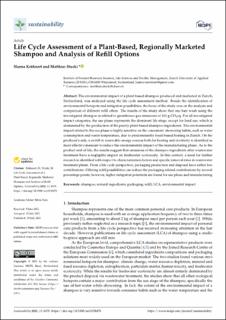Please use this identifier to cite or link to this item:
https://doi.org/10.21256/zhaw-23534| Publication type: | Article in scientific journal |
| Type of review: | Peer review (publication) |
| Title: | Life cycle assessment of a plant-based, regionally marketed shampoo and analysis of refill options |
| Authors: | Kröhnert, Hanna Stucki, Matthias |
| et. al: | No |
| DOI: | 10.3390/su13158478 10.21256/zhaw-23534 |
| Published in: | Sustainability |
| Volume(Issue): | 13 |
| Issue: | 15 |
| Issue Date: | 29-Jul-2021 |
| Publisher / Ed. Institution: | MDPI |
| ISSN: | 2071-1050 |
| Language: | English |
| Subjects: | Shampoo; Natural ingredients; Packaging; Refill; LCA; Environmental impact |
| Subject (DDC): | 363: Environmental and security problems |
| Abstract: | The environmental impact of a plant-based shampoo produced and marketed in Zurich, Switzerland, was analyzed using the life cycle assessment method. Beside the identification of environmental hotspots and mitigation possibilities, the focus of the study was on the analysis and comparison of different refill offers. The results of the study show that one hair wash using the investigated shampoo is related to greenhouse gas emissions of 161 g CO2eq. For all investigated impact categories, the use phase represents the dominant life stage, except for land use, which is dominated by the production of the purely plant-based shampoo ingredients. The environmental impact related to the use phase is highly sensitive on the consumers’ showering habits, such as water consumption and water temperature, due to predominantly fossil-based heating in Zurich. On the producer’s side, a switch to renewable energy sources both for heating and electricity is identified as most effective measure to reduce the environmental impact of the manufacturing phase. As to the product end-of-life, the results suggest that emissions of the shampoo ingredients after wastewater treatment have a negligible impact on freshwater ecotoxicity. In this context, a need for further research is identified with respect to characterization factors and specific removal rates in wastewater treatment plants. From a life cycle perspective, packaging production and disposal have rather low contributions. Offering refill possibilities can reduce the packaging related contributions by several percentage points, however, higher mitigation potentials are found for use phase and manufacturing. |
| URI: | https://digitalcollection.zhaw.ch/handle/11475/23534 |
| Fulltext version: | Published version |
| License (according to publishing contract): | CC BY 4.0: Attribution 4.0 International |
| Departement: | Life Sciences and Facility Management |
| Organisational Unit: | Institute of Natural Resource Sciences (IUNR) |
| Appears in collections: | Publikationen Life Sciences und Facility Management |
Files in This Item:
| File | Description | Size | Format | |
|---|---|---|---|---|
| 2021_Kröhnert_Life_Cycle_Assessment_of_a_Plant-Based_Regionally_Marketed_Shampoo_Sustainability.pdf | 1.36 MB | Adobe PDF |  View/Open |
Show full item record
Kröhnert, H., & Stucki, M. (2021). Life cycle assessment of a plant-based, regionally marketed shampoo and analysis of refill options. Sustainability, 13(15). https://doi.org/10.3390/su13158478
Kröhnert, H. and Stucki, M. (2021) ‘Life cycle assessment of a plant-based, regionally marketed shampoo and analysis of refill options’, Sustainability, 13(15). Available at: https://doi.org/10.3390/su13158478.
H. Kröhnert and M. Stucki, “Life cycle assessment of a plant-based, regionally marketed shampoo and analysis of refill options,” Sustainability, vol. 13, no. 15, Jul. 2021, doi: 10.3390/su13158478.
KRÖHNERT, Hanna und Matthias STUCKI, 2021. Life cycle assessment of a plant-based, regionally marketed shampoo and analysis of refill options. Sustainability. 29 Juli 2021. Bd. 13, Nr. 15. DOI 10.3390/su13158478
Kröhnert, Hanna, and Matthias Stucki. 2021. “Life Cycle Assessment of a Plant-Based, Regionally Marketed Shampoo and Analysis of Refill Options.” Sustainability 13 (15). https://doi.org/10.3390/su13158478.
Kröhnert, Hanna, and Matthias Stucki. “Life Cycle Assessment of a Plant-Based, Regionally Marketed Shampoo and Analysis of Refill Options.” Sustainability, vol. 13, no. 15, July 2021, https://doi.org/10.3390/su13158478.
Items in DSpace are protected by copyright, with all rights reserved, unless otherwise indicated.